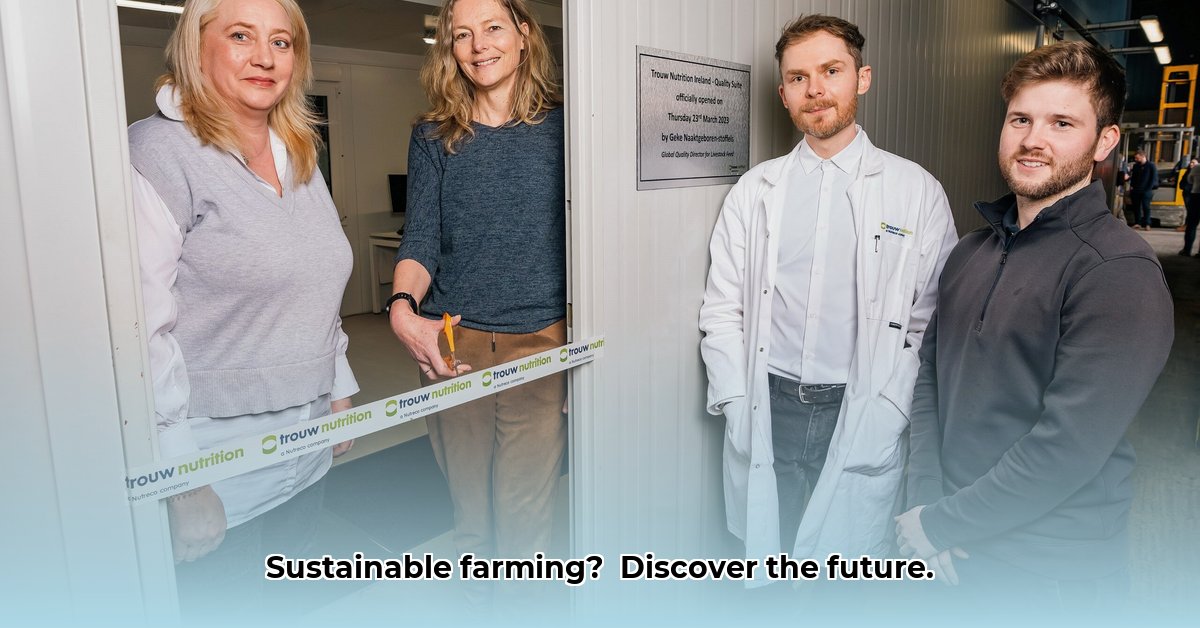
A Holistic Approach to Feeding the World Responsibly
Is it possible to feed a growing global population without compromising the health of our planet? This is the challenge facing the agricultural sector, and Trouw Nutrition is tackling it head-on. Their approach isn't about simply increasing yields; it's about building a more resilient and circular food system, one that operates in harmony with nature. Forget isolated solutions; Trouw focuses on the entire farming process – from optimising animal feed formulations and incorporating unique feed additives to employing expert farm management techniques. Their integrated strategy, spanning over 105 countries, aims to boost efficiency and promote sustainability globally. But how, exactly, does this ambitious vision translate into tangible action?
The Trouw Model: Working Together for a Greener Tomorrow
Trouw's strength lies in its holistic approach — a carefully orchestrated system where every component plays a vital role. Their specialized animal feeds are meticulously designed to meet the unique nutritional needs of diverse animals, maximizing productivity while minimizing waste. Innovative feed additives, often replacing reliance on antibiotics, enhance animal health and well-being. Furthermore, their expertise in farm management empowers farmers to optimize resource utilization, reducing environmental impact. This interwoven strategy contributes to a more sustainable and efficient agricultural landscape.
Consider the varied global contexts: In water-stressed regions, Trouw develops feed formulations requiring less water. In areas with limited land availability, they collaborate with farmers on improved pasture management techniques, increasing yields without expanding farmland. And, in regions grappling with climate variability, they focus on developing feeds that enhance animal resilience to heat stress and other climate-related challenges. This adaptability demonstrates their commitment to understanding and addressing the unique challenges faced by farmers worldwide. It's about far more than simply selling products; it’s about building partnerships and finding solutions that work.
Challenges and Opportunities: Adapting to a Changing World
The path to sustainable agriculture isn't without its challenges. Trouw faces fierce competition, constantly evolving regulations, and the ever-present uncertainties of climate change. Yet, instead of seeing these obstacles as insurmountable barriers, Trouw views them as opportunities for innovation and improvement. How? Through consistent investment in research and development, proactive adaptation to evolving needs, and collaboration within the agricultural sector. Their approach is agile and responsive to global environmental and economic shifts.
For example, mitigating climate change risks might involve investing in research on feed ingredients resilient to drought or extreme weather. Navigating regulatory changes might entail proactive engagement with policymakers to ensure their solutions align with evolving sustainable standards. This responsiveness and adaptability demonstrate Trouw's commitment to long-term sustainability.
Actionable Steps Towards a More Sustainable Future
What can you do to contribute? There are various roles we can all play:
For Farmers:
- Short-Term: Explore Trouw's tailored solutions and participate in their pilot programs to assess their applicability to your own operation.
- Long-Term: Invest in training and advanced technologies (like precision agriculture) to optimize efficiency and sustainability practices.
For Governments and NGOs:
- Short-Term: Prioritize funding for research and development in sustainable agriculture and offer incentives (tax breaks or subsidies) for farmers to adopt responsible practices.
- Long-Term: Develop clear, consistent sustainability standards and regulations, encouraging innovation while safeguarding the environment. Increase investment in sustainable agriculture research.
For Consumers:
- Short-Term: Make informed purchasing decisions; choose food from companies prioritizing sustainability; look for certifications that reflect responsible practices.
- Long-Term: Support policies and initiatives that empower sustainable agriculture; advocate for greater transparency and labeling in the food industry.
For Trouw Nutrition:
- Short-Term: Improve transparency by publishing independently verified data demonstrating the positive environmental and social impacts of their solutions (quantifying improvements in resource use, yield increases, and environmental impact reductions).
- Long-Term: Conduct comprehensive life-cycle assessments to evaluate the complete environmental footprint of their products and services, identifying areas for further improvement.
The Importance of Data and Transparency: A Path to Better Understanding
To fully assess Trouw's impact, more comprehensive and publicly available data is crucial. While their commitment to sustainability is evident, quantifiable results regarding resource efficiency, greenhouse gas emissions, and biodiversity enhancements are needed for a complete picture. Ongoing research is vital to understanding the long-term effects of Trouw's solutions. This transparency not only builds trust but also informs continual improvement. It's through collaboration and open information sharing that we can collectively build a brighter and more sustainable future.